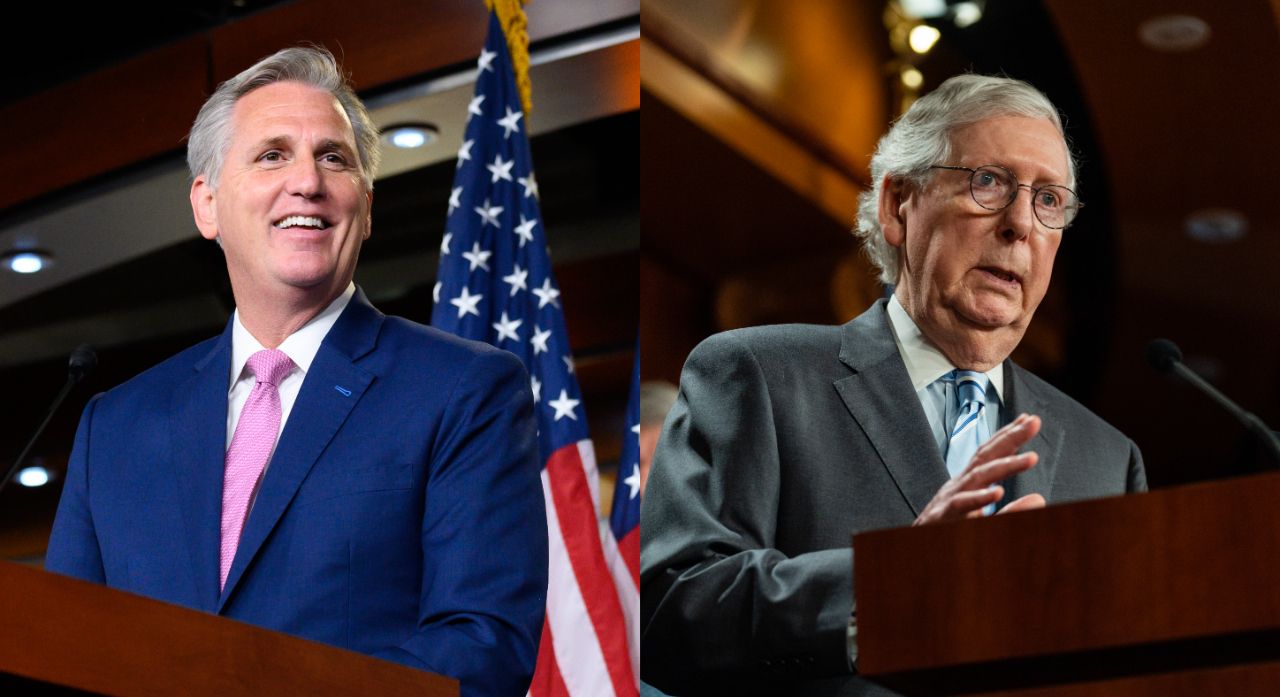
Even Republicans are beginning to acknowledge that their path back to power in the Senate in this fall's elections is far less clear than in the House.
Why it matters: The sharp divergence between the GOP's fortunes in the two chambers highlights the role candidate recruitment — and the involvement of former President Trump — has played in the 2022 midterm cycle.
Driving the news: Senate Minority Leader Mitch McConnell (R-Ky.) admitted at an event in his home state on Thursday that "there's probably a greater likelihood the House flips than the Senate."
- "Senate races are just different, they're statewide, candidate quality has a lot to do with the outcome," he said.
The big picture: Republicans are facing persistent candidate quality problems and money issues in winnable Senate races.
- Ohio: In a state Trump won by 10 points, the McConnell-affiliated Senate Leadership Fund is suddenly intervening with a massive $28 million ad reservation on behalf of Republican J.D. Vance, who is running neck and neck with Rep. Tim Ryan (D-Ohio).
- Pennsylvania: Republican Mehmet Oz has faced a cascade of negative stories focused on his wealth and New Jersey roots, gleefully boosted by the internet-savvy campaign of his Democratic opponent, Lt. Gov. John Fetterman.
- Wisconsin: Sen. Ron Johnson (R-Wis.) is trying to salvage his unfavorable image in his home state amid a spirited challenge from progressive Lt. Gov. Mandela Barnes.
- Georgia: Republican Herschel Walker's effort to unseat Sen. Raphael Warnock (D-Ga.) has been beset by a cascade of gaffes, previously undisclosed children and scrutiny of his troubled past.
- Arizona: Democrats have seized on extreme positions by Trump-backed nationalist Blake Masters — especially on abortion and Social Security — in hopes of tanking his bid against Sen. Mark Kelly (D-Ariz.).
Yes, but: Republicans still see hope in Georgia and Arizona as well as states like Nevada and New Hampshire, where Democratic incumbents face harsh realities in a year in which inflation and rising gas prices have the fundamentals squarely on the GOP's side.
The other side: House Republicans, meanwhile, are targeting districts President Biden won by double digits in an ambitious effort to pad the majority they're confident they'll win.
- House Minority Leader Kevin McCarthy, for example, has made a concerted effort to boost Allan Fung, Republicans' nominee in Rhode Island's 2nd District, which President Biden won by more than 13 points.
- They're also eyeing districts like New York's 17th, home of Rep. Sean Patrick Maloney (D-N.Y.), chair of the Democratic Congressional Campaign Committee.
What we're hearing: Republican operatives who spoke to Axios credited House Republicans' active involvement in primaries — in contrast with Senate Republicans' policy of neutrality — as the driver of their success.
- The vacuum left by the Senate Republican establishment was filled by former President Trump, who values personal fealty far more than electability.
What they're saying: "Republican outside groups have taken a more active role in open primaries to promote electable candidates and get them through their primaries," said one Republican campaign operative, pointing to the McCarthy-aligned Congressional Leadership Fund spending $7 million in primaries.
- McCarthy and National Republican Congressional Committee Chair Tom Emmer (R-Minn.) "have done an amazing job of recruiting the best class of candidates to have ever run as House Republicans, both in quantity and quality," said one national GOP strategist.
- "That's one of the main reasons we are seeing House Republicans reach deep into traditionally Democrat seats and compete."
The bottom line: FiveThirtyEight's election forecasting model puts Republicans' odds to win the House at 77 in 100 — compared to 36 in 100 for winning the Senate.







